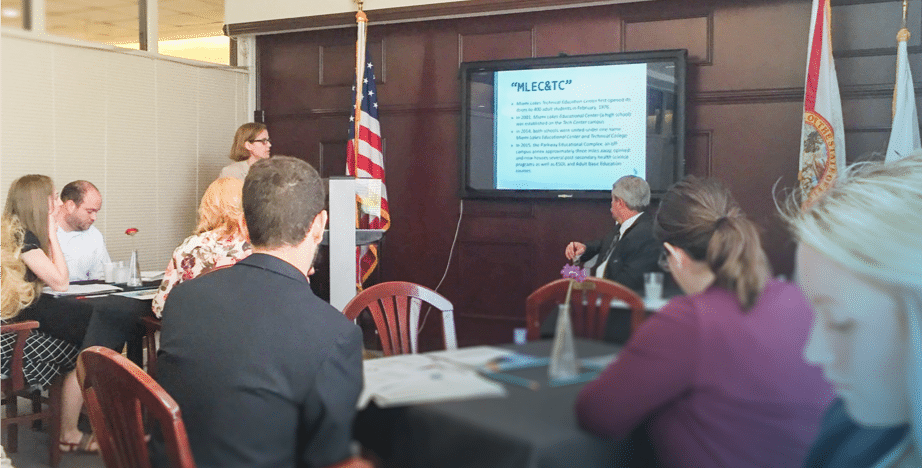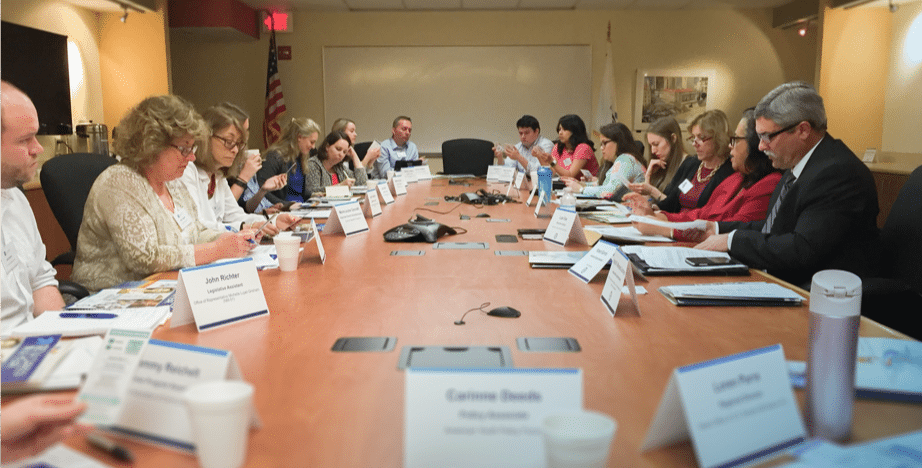Overview
A recent study, The New Forgotten Half and Research Directions to Support Them, commissioned by the William T. Grant Foundation, finds that many young people who enroll in college fail to complete their studies and attain a degree and that these youth fare no better in the labor market than those with only a high school diploma. And while 37 percent of on-time high school graduates enroll in community colleges and intend ultimately to pursue bachelor’s degrees, nearly half (46 percent) drop out within eight years, earning no degree and incurring significant expenses. These young people, who pursue but do not complete their higher education, are, according to the authors, the new forgotten half.
This discussion addressed the challenges facing students and the institutions that serve them, and talked about strategies to help the new forgotten half get ahead and achieve their potential.
Panel I
Adam Gamoran, President, William T. Grant Foundation
James Rosenbaum, Professor, Northwestern University and lead author
Barbara Veazey, President, West Kentucky Community and Technical College
Panel II
Mark Mitsui, Deputy Assistant Secretary for Community College, OCTAE, U.S. Department of Education
Josh Wyner, Executive Director, College Excellence Program, Aspen Institute
Gardner Carrick, Vice President for Strategic Initiatives, Manufacturing Institute, National Association of Manufacturers
About the New Forgotten Half and Research Directions to Support Them:
Twenty-five years after the publication of “The Forgotten Half,” which alerted us to the struggles of young people who did not attend college, James Rosenbaum and colleagues examine the circumstances of the “New Forgotten Half”: youth who attend college but drop out before attaining a credential. Using data from the nationally representative Educational Longitudinal Survey, the authors illustrated the obstacles these students encounter after entering college, discussed institutional challenges in the era of increased college access, and outlined an agenda to help youth move beyond “some college.”
www.wtgrantfoundation.org/newforgottenhalf
Presenter Biographies:
 Gardner Carrick is the Vice President of Strategic Initiatives at The Manufacturing Institute. Mr. Carrick leads the Institute’s research activities including partnerships with internationally recognized consulting firms and the production of a regular series of reports on the issues and challenges affecting the U.S. manufacturing sector. Mr. Carrick also leads the Institute’s efforts with the U.S. military to assist transitioning personnel and is responsible for the workforce and education outreach activities in several states.
Gardner Carrick is the Vice President of Strategic Initiatives at The Manufacturing Institute. Mr. Carrick leads the Institute’s research activities including partnerships with internationally recognized consulting firms and the production of a regular series of reports on the issues and challenges affecting the U.S. manufacturing sector. Mr. Carrick also leads the Institute’s efforts with the U.S. military to assist transitioning personnel and is responsible for the workforce and education outreach activities in several states.
Prior to joining the Institute, Mr. Carrick worked at the U.S. Department of Labor’s Employment and Training Administration where he served as the Project Director for a $325 million initiative focusing on talent development in 39 regions across the country. The project worked to integrate the workforce development, economic development, and education strategies of a region to create the talent base required to drive economic growth. He managed a team of over 100 staff and consultants working on the project.
Mr. Carrick also served as the Communications Director for the agency. He was responsible for developing outreach materials describing the programs and services offered by the Labor Department, writing speeches for the Assistant Secretary, expanding the agency’s web presence, and managing special projects on recruiting and developing talent for the construction industry.Prior to joining the U.S. Department of Labor, Mr. Carrick was a Senior Associate at TATC Consulting, a Washington DC-based firm focused on providing expertise to federal and state agencies on employment and education related issues.
 Adam Gamoran joined the William T. Grant Foundation as president in September 2013. Previously he held the John D. MacArthur Chair in Sociology and Educational Policy Studies at the University of Wisconsin-Madison, where he directed the Wisconsin Center for Education Research. In a research career spanning three decades, Gamoran conducted a wide range of studies focusing on inequality in education and school reform. At the Foundation, he is leading a new initiative to support research on programs, policies, and practices to reduce inequality, and continuing the Foundation’s ongoing efforts to understand the use of research evidence in decision-making. He has published numerous articles, chapters, and books on these topics, for example serving as lead author of Transforming Teaching in Math and Science: How Schools and Districts Can Support Change (Teachers College Press, 2003) and as editor of Standards-Based Reform and the Poverty Gap: Lessons for No Child Left Behind (Brookings Institution Press, 2007). He also chaired the Independent Advisory Panel of the National Assessment of Career and Technical Education for the U.S. Department of Education, and currently chairs the National Research Council’s Board on Science Education. He is an elected member of the National Academy of Education and the American Academy of Arts and Sciences, and was twice appointed by President Barack Obama to serve on the National Board for Education Sciences.
Adam Gamoran joined the William T. Grant Foundation as president in September 2013. Previously he held the John D. MacArthur Chair in Sociology and Educational Policy Studies at the University of Wisconsin-Madison, where he directed the Wisconsin Center for Education Research. In a research career spanning three decades, Gamoran conducted a wide range of studies focusing on inequality in education and school reform. At the Foundation, he is leading a new initiative to support research on programs, policies, and practices to reduce inequality, and continuing the Foundation’s ongoing efforts to understand the use of research evidence in decision-making. He has published numerous articles, chapters, and books on these topics, for example serving as lead author of Transforming Teaching in Math and Science: How Schools and Districts Can Support Change (Teachers College Press, 2003) and as editor of Standards-Based Reform and the Poverty Gap: Lessons for No Child Left Behind (Brookings Institution Press, 2007). He also chaired the Independent Advisory Panel of the National Assessment of Career and Technical Education for the U.S. Department of Education, and currently chairs the National Research Council’s Board on Science Education. He is an elected member of the National Academy of Education and the American Academy of Arts and Sciences, and was twice appointed by President Barack Obama to serve on the National Board for Education Sciences.
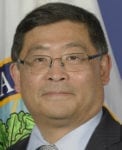 Mark Mitsui is the Deputy Assistant Secretary for Community Colleges at the U.S. Department of Education in the Office of Career, Technical and Adult Education. He is a liaison to the community college sector and provides policy input on issues related to the community colleges and the students they serve. He is the former president of North Seattle College, Vice President of Student Services at South Seattle College, Assistant Dean at Green River Community College and faculty at Renton Technical College. He led the effort at SSC to obtain one of the first ever designations as an Asian American and Pacific Islander Serving Institution, a new MSI designation. He received the 2013 Rhonda Quash Coates Award for Excellence by the Multicultural Student Services Directors Council for his efforts to improve academic outcomes for underrepresented students, an Exemplary Leadership Award from the Chair Academy in 2006 and an Outstanding Faculty Award in 1992. He began his new duties in August of 2013.
Mark Mitsui is the Deputy Assistant Secretary for Community Colleges at the U.S. Department of Education in the Office of Career, Technical and Adult Education. He is a liaison to the community college sector and provides policy input on issues related to the community colleges and the students they serve. He is the former president of North Seattle College, Vice President of Student Services at South Seattle College, Assistant Dean at Green River Community College and faculty at Renton Technical College. He led the effort at SSC to obtain one of the first ever designations as an Asian American and Pacific Islander Serving Institution, a new MSI designation. He received the 2013 Rhonda Quash Coates Award for Excellence by the Multicultural Student Services Directors Council for his efforts to improve academic outcomes for underrepresented students, an Exemplary Leadership Award from the Chair Academy in 2006 and an Outstanding Faculty Award in 1992. He began his new duties in August of 2013.
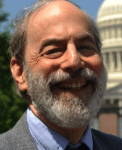 James Rosenbaum’s current major area of research concerns the college-for-all movement, college attendance and coaches, high-school-to-work transitions, and linkages among students, schools, and employers. A specialist in research on work, education, and housing opportunities, Rosenbaum has published six books and many articles on these subjects. His ideas about community college reforms were implemented in the design of the new Guttman Community College in CUNY, and in the proposals of the reform group, Complete College America. Rosenbaum has testified before Congressional committees on several occasions. He is an advisor to Completion by Design, a national demonstration program of community college reform, and to an evaluation of the Florida College and Career Readiness Initiative, which is implementing an idea he proposed in 2001.
James Rosenbaum’s current major area of research concerns the college-for-all movement, college attendance and coaches, high-school-to-work transitions, and linkages among students, schools, and employers. A specialist in research on work, education, and housing opportunities, Rosenbaum has published six books and many articles on these subjects. His ideas about community college reforms were implemented in the design of the new Guttman Community College in CUNY, and in the proposals of the reform group, Complete College America. Rosenbaum has testified before Congressional committees on several occasions. He is an advisor to Completion by Design, a national demonstration program of community college reform, and to an evaluation of the Florida College and Career Readiness Initiative, which is implementing an idea he proposed in 2001.
 Dr. Barbara Veazey is President of West Kentucky Community and Technical College (WKCTC). She was appointed president/CEO of Paducah Community College (PCC) and West Kentucky Technical College (WKTC) in 2002 and became the first president of WKCTC when the two colleges consolidated in 2003. Dr. Veazey began her career in education as a nursing instructor, chair of the nursing program and later the dean of academic affairs. When Dr. Veazey became president in 2002, her goal was to work with faculty, staff, students and the community to develop and build a truly premier comprehensive community and technical college. Today enrollment exceeds 10,000 students and the college offers more than 400 associate degree, diploma, and certificate options in 48 academic programs.
Dr. Barbara Veazey is President of West Kentucky Community and Technical College (WKCTC). She was appointed president/CEO of Paducah Community College (PCC) and West Kentucky Technical College (WKTC) in 2002 and became the first president of WKCTC when the two colleges consolidated in 2003. Dr. Veazey began her career in education as a nursing instructor, chair of the nursing program and later the dean of academic affairs. When Dr. Veazey became president in 2002, her goal was to work with faculty, staff, students and the community to develop and build a truly premier comprehensive community and technical college. Today enrollment exceeds 10,000 students and the college offers more than 400 associate degree, diploma, and certificate options in 48 academic programs.
Outreach has been a hallmark of Dr. Veazey’s tenure as president with the opening of the Mary Ellen Thompson Health Education Center at Elmwood Court and the Weaks Community Center in Murray, Ky. The $18.5 million dollar Emerging Technology Center, including the Fred Paxton Engineering Research Center, opened in January 2010. The opening of this facility created a full partnership between economic development and the college to serve both existing and prospective businesses. The Skilled Craft Training Center in Mayfield, Ky. opened in fall 2010. The 60,000 sq. ft. facility is a showplace that serves distant counties with new and highly technical programs. The Paducah School of Art and Design (PSAD) opened in the fall of 2008 with the goal to expand and enhance the community’s image as an arts destination, and serve as catalyst in future development. The final phase of a $15 million dollar campus, located in Lowertown, Paducah, will open in January, 2016. The PSAD was a major component of Paducah being named a United Nations Educational, Scientific and Cultural Organization (UNESCO) Creative City. WKCTC has been recognized three consecutive times by The Aspen Institute as an Aspen Prize Top 10 Community College and twice as a Finalist with Distinction.
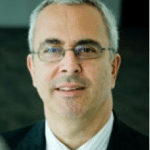 Joshua Wyner is Vice President and Executive Director of the College Excellence Program at the Aspen Institute. The Program’s first two initiatives are the Aspen Prize for Community College Excellence, which strives to shine a spotlight on community colleges that deliver exceptional student results, and the New College Leadership Project, which works to align the hiring and professional development of college presidents with the goal of substantially improving student success. After several years as a program evaluator and an attorney, Josh has spent the past two decades as a nonprofit leader, initiating organizations aimed at improving and equalizing educational outcomes. Josh has authored numerous reports, op-eds, and other publications about education, including a 2014 book, What Excellent Community Colleges Do: Preparing All Students for Success (Harvard Education Press). He has a B.A. in History from Vassar College, a Masters in Public Administration from Syracuse University, and a J.D. from New York University School of Law.
Joshua Wyner is Vice President and Executive Director of the College Excellence Program at the Aspen Institute. The Program’s first two initiatives are the Aspen Prize for Community College Excellence, which strives to shine a spotlight on community colleges that deliver exceptional student results, and the New College Leadership Project, which works to align the hiring and professional development of college presidents with the goal of substantially improving student success. After several years as a program evaluator and an attorney, Josh has spent the past two decades as a nonprofit leader, initiating organizations aimed at improving and equalizing educational outcomes. Josh has authored numerous reports, op-eds, and other publications about education, including a 2014 book, What Excellent Community Colleges Do: Preparing All Students for Success (Harvard Education Press). He has a B.A. in History from Vassar College, a Masters in Public Administration from Syracuse University, and a J.D. from New York University School of Law.
Click here to view the presentation slideshow
Presenter Contact Information:
Gardner Carrick
Vice President for Strategic Initiatives
The Manufacturing Institute
National Association of Manufacturers
733 10th Street, NW, Suite 700
Washington, DC 20001
Adam Gamoran
President
William T. Grant Foundation
570 Lexington Avenue, 18th Floor
New York, NY 10022
Mark Mitsui
Deputy Assistant Secretary for Community Colleges
Office of Career, Technical and Adult Education
US Department of Education
James Rosenbaum
Professor of Sociology and Education and Social Policy
Institute for Policy Research
Northwestern University
2040 Sheridan Road
Evanston, IL 60208
Barbara Veazey
President
West Kentucky Community and Technical College
4810 Alben Barkley Drive
Paducah, KY 42001


